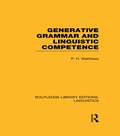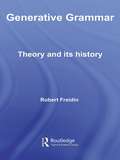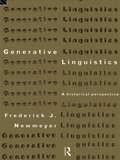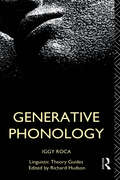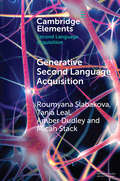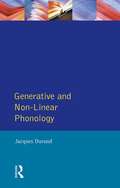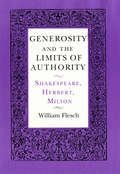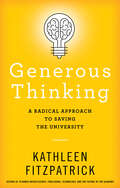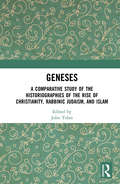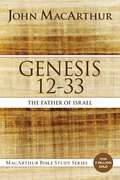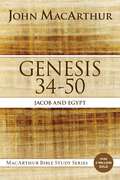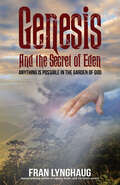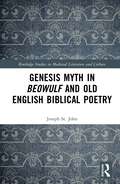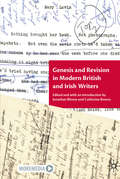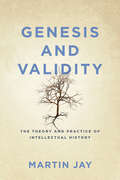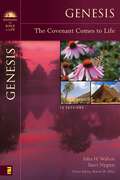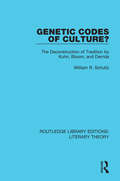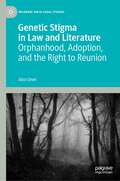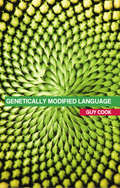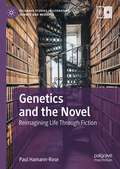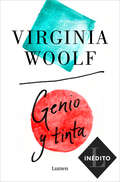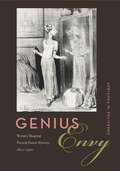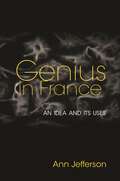- Table View
- List View
Generative Grammar and Linguistic Competence (Routledge Library Editions: Linguistics)
by P. H. MatthewsAccording to Chomsky, to learn a language is to develop a grammar for it – a generative grammar which assigns a definite structure and a definite meaning to each of a definite set of sentences. This forms the speaker’s linguistic competence, which represents a distinct faculty of the mind, called the faculty of language. This view has been widely criticised, from many separate angles and by many different authors, including some of Chomsky’s pupils. As one of the earliest and most persistent critics, Professor Matthews is especially well placed to tie these arguments together. He concludes that Chomsky’s notion of competence finds no support within linguistics. It can be defended, if at all, only by assuming a traditional philosophy of mind. The notion of grammar should therefore be restricted to descriptive linguistics, and should not have psychological interpretations foisted on it. Peter Matthews’ book covers a variety of topics, from morphology to speech acts, from word meaning to the study of language variation, and from blending in syntax to the relation of language and culture. This wide range of subject matter is incisively handled in a style which is both elegant and economical.
Generative Grammar: Theory and its History (Routledge Leading Linguists)
by Robert FreidinGenerative Grammar presents a substantial contribution to the field of linguistics in drawing together for the first time the author's most significant work on the theory of generative grammar. The essays collected here display Freidin's role in moving the theory forward in terms of new proposals, and analyse the efforts to understand the evolution and history of the theory by careful investigation of how and why it has changed over the years.
Generative Linguistics: An Historical Perspective (History of Linguistic Thought)
by Frederick J. NewmeyerFirst published in 1997. Routledge is an imprint of Taylor & Francis, an informa company.
Generative Phonology (Linguistic Theory Guides)
by Iggy Roca"Generative Phonology" offers an overview of the post-SPE theory of generative phonology and is suitable for linguists not specializing in phonology, who want to keep abreast of the latest developments in the subject. It deals with all the major trends in what has come to be known as "non-linear" phonology, including: particle phonology; dependancy phonology; government and charm phonology. Iggy Roca guides the reader through the developments of the various approaches, justifying their rationale against the background of SPE machinery, and providing the reader with the basic tools necessary to penetrate current problems and debates. This text aims to integrate the modules and proposals of what can seem a fragmentary field, into a cohesive body of living theory.
Generative Second Language Acquisition (Elements in Second Language Acquisition)
by Roumyana Slabakova Tania Leal Amber Dudley Micah StackMost human beings grow up speaking more than one language; a lot of us also acquire an additional language or languages other than our mother tongue. This Element in the Second Language Acquisition series investigates the human capacity to learn additional languages later in life and introduces the seminal processes involved in this acquisition. The authors discuss how to analyze learner data and what the findings tell us about language learning; critically assessing a leading theory of how adults learn a second language: Generative SLA. This theory describes both universal innate knowledge and individual experiences as crucial for language acquisition. This Element makes the relevant connections between first and second language acquisition and explores whether they are fundamentally similar processes. Slabakova et al. provide fascinating pedagogical questions that encourage students and teachers to reflect upon the experiences of second language learners.
Generative and Non-Linear Phonology (Longman Linguistics Library)
by Durand JacquesGenerative phonology is a developing field of linguistics, and is producing both rival interpretations and models. This book provides a clear and accessible evaluation of the debate. It provides a detailed overview of the main models, revealing that they are often complimentary rather than contradictory, and how these can be interconnect and be used together to explore the subject.
Generosity and the Limits of Authority: Shakespeare, Herbert, Milton
by William FleschGenerosity is an ambiguous quality, William Flesch observes; while receiving gifts is pleasant, gift-giving both displays the wealth and strength of the giver and places the receiver under an obligation. In provocative new readings of Shakespeare, Herbert, and Milton, Flesch illuminates the personal authority that is bound inextricably with acts of generosity.Drawing on the work of such theorists as Mauss, Blanchot, Bourdieu, Wittgenstein, Bloom, Cavell, and Greenblatt, Flesch maintains that the literary power of Shakespeare, Herbert, and Milton is at its most intense when they are exploring the limits of generosity. He considers how in Herbert's Temple divine assurance of the possibility of redemption is put into question and how the poet approaches such a gift with the ambivalence of a beneficiary. In his readings of Shakespeare's Richard II, Henry IV, King Lear, Antony and Cleopatra, and the sonnets, Flesch examines the perspective of the benefactor—including Shakespeare himself—who confronts the decline of his capacity to give. Turning to Milton's Paradise Lost, Flesch identifies two opposing ways of understanding generosity—Satan's, on the one hand, and Adam and Eve's, on the other - and elaborates the different conceptions of poetry to which these understandings give rise.Scholars of Shakespeare and of Renaissance culture, Miltonists, literary theorists, and others interested in the relationship between philosophy and literature will want to read this insightful and challenging book.
Generous Thinking: A Radical Approach to Saving the University
by Kathleen FitzpatrickCan the university solve the social and political crisis in America?Higher education occupies a difficult place in twenty-first-century American culture. Universities—the institutions that bear so much responsibility for the future health of our nation—are at odds with the very publics they are intended to serve. As Kathleen Fitzpatrick asserts, it is imperative that we re-center the mission of the university to rebuild that lost trust. Critical thinking—the heart of what academics do—can today often negate, refuse, and reject new ideas. In an age characterized by rampant anti-intellectualism, Fitzpatrick charges the academy with thinking constructively rather than competitively, building new ideas rather than tearing old ones down. She urges us to rethink how we teach the humanities and to refocus our attention on the very human ends—the desire for community and connection—that the humanities can best serve. One key aspect of that transformation involves fostering an atmosphere of what Fitzpatrick dubs "generous thinking," a mode of engagement that emphasizes listening over speaking, community over individualism, and collaboration over competition.Fitzpatrick proposes ways that anyone who cares about the future of higher education can work to build better relationships between our colleges and universities and the public, thereby transforming the way our society functions. She encourages interested stakeholders to listen to and engage openly with one another's concerns by reading and exploring ideas together; by creating collective projects focused around common interests; and by ensuring that our institutions of higher education are structured to support and promote work toward the public good. Meditating on how and why we teach the humanities, Generous Thinking is an audacious book that privileges the ability to empathize and build rather than simply tear apart.
Geneses: A Comparative Study of the Historiographies of the Rise of Christianity, Rabbinic Judaism, and Islam
by John TolanWhat is a religion? How do we discern the boundaries between religions, or religious communities? When does Judaism become Judaism, Christianity become Christianity, Islam become Islam? Scholars have increasingly called into question the standard narratives created by the various orthodoxies, narratives of steadfastness and consistency, of long and courageous maintenance of true doctrine and right practice over the centuries, in the face of opposition (and at times persecution) at the hands of infidels or heretics. The 11 chapters in this book, Geneses: A Comparative Study of the Historiographies of the Rise of Christianity, Rabbinic Judaism and Islam, written by an international group of specialists the languages, religions, laws and cultures of early Judaism, Christianity and Islam, tackle these questions through a comparative study of these narratives: their formation over time, and their use today. They explore three key aspects of the field: (1) the construction (and scholarly deconstruction) of the narratives of triumph (and defeat) of religions, (2) how legal imperatives are constructed from religious narratives and sacred texts, and (3) contemporary ramifications of these issues. In doing so, they tap into the significant body of research over the last 30 years, which has shown the fluidity and malleability of these religious traditions in relation to each other and to more traditional "pagan" and Zoroastrian religions and philosophical traditions. This book represents an important contribution to, and a valuable resource for, the burgeoning field of comparative history of the Abrahamic religions.
Genesis 12 to 33: The Father of Israel (MacArthur Bible Studies)
by John F. MacArthurAbraham is known as the "father of Israel" because God appeared to him and promised that his descendants would become a great nation. Yet Abraham is much more than the patriarch of a select group of ancient people. Through Abraham's descendants, God's own Son, Jesus, was born. It's through Abraham that God blessed all people. In this study, pastor John MacArthur will guide you through an in-depth look at the historical period beginning with Abraham's call from God, continuing through his relocation in the land of Canaan, and concluding with the story of his grandsons Jacob and Esau.This study includes close-up examinations of Sarah, Hagar, Ishmael, and Isaac, as well as careful considerations of doctrinal themes such as "Covenant and Obedience" and "Wrestling with God."—ABOUT THE SERIES—The MacArthur Bible Study series is designed to help you study the Word of God with guidance from widely respected pastor and author John MacArthur. Each guide provides intriguing examinations of the whole of Scripture by examining its parts and incorporates:Extensive, but straight-forward commentary on the text.Detailed observations on overriding themes, timelines, history, and context.Word and phrase studies to help you unlock the broader meaning and apply it to your life.Probing, interactive questions with plenty of space to write down your response and thoughts.
Genesis 34 to 50: Jacob and Egypt (MacArthur Bible Studies)
by John F. MacArthurNearly half of the book of Genesis is devoted to the lives of Jacob and his twelve sons, who were important figures in the history of Israel and in God's plan for redemption. The account of their lives takes the term "dysfunctional family" to a new level, but God used this flawed clan as a beautiful canvas to portray His providence, judgment, and mercy. In this study, pastor John MacArthur will guide you through an in-depth look at the historical period beginning with Jacob's first encounter with Rachel, continuing through their son Joseph's captivity as an Egyptian slave, and concluding with the dramatic rescue of Jacob's family.This study includes close-up examinations of Dinah (Jacob's daughter), Judah, Tamar, and Pharaoh's chief butler, as well as careful considerations of doctrinal themes such as "The Sovereignty of God" and "Finishing in Faith."—ABOUT THE SERIES—The MacArthur Bible Study series is designed to help you study the Word of God with guidance from widely respected pastor and author John MacArthur. Each guide provides intriguing examinations of the whole of Scripture by examining its parts and incorporates:Extensive, but straight-forward commentary on the text.Detailed observations on overriding themes, timelines, history, and context.Word and phrase studies to help you unlock the broader meaning and apply it to your life.Probing, interactive questions with plenty of space to write down your response and thoughts.
Genesis And the Secret of Eden: Anything is possible in the garden of God
by Fran LynghaugA cloudy fog rose abruptly out of the ground about fifty feet in front of them. A magnificently handsome figure in its midst gradually took shape. He didn't send his thoughts to them the same way Adam and Eve talked with their thoughts, but used spoken verbiage. “My greetings to you...” That was as far as he got. Raphael and Uriel drew their swords from sheaths that were hidden in a fold of their tunics, readying for a charge. They obviously knew this person and braced for battle. For the first time, Eve experienced confusion. She didn't know what it was like to flee. She just knew she had to leave quickly. She lifted into the sky and when she had attained a good height, she darted toward the palace. She was aware of someone at her side. It was Uriel. He didn't speak to her thoughts, but his expression was grim.
Genesis Myth in Beowulf and Old English Biblical Poetry (Routledge Studies in Medieval Literature and Culture)
by Joseph St. JohnGenesis Myth in Beowulf and Old English Biblical Poetry explores the adaptation of antediluvian Genesis and related myth in the Old Testament poems Genesis A and Genesis B, as well as in Beowulf, a secular heroic narrative.The book explores how the Genesis poems resort to the Christian exegetical tradition and draw on secular social norms to deliver their biblically derived and related narratives in a manner relevant to their Christian Anglo-Saxon audiences. In this book it is suggested that these elements work in unison, and that the two Genesis poems function coherently in the context of the Junius 11 manuscript. Moreover, the book explores recourse to Genesis-derived myth in Beowulf, and points to important similarities between this text and the Genesis poems. It is therefore shown that while Beowulf differs from the Genesis poems in several respects, it belongs in a corpus where religious verse enjoys prominence.
Genesis and Revision in Modern British and Irish Writers
by Jonathan Bloom Catherine RoveraThis unusually diverse collection of ten essays, devoted to British and Irish writers and poets from 1895 to the present, explores many aspects of the creative process, from inspiration to publication and beyond. The volume shows how writers’ manuscripts and revisions give us a better understanding of their published work by drawing on unpublished archival sources to unveil, across genre and gender, the intricacies of their craft. It examines how the paper medium and writing implements influence the act of composition; reveals the latest developments in such fields as life writing and digital humanities—especially how modern scholars, through the filter of hypertext, revisit modernist texts, or respond to newly-found material; and analyzes the hidden handwork, be it throughout the writer’s exhaustive self-editing process or the writer-editor collaboration. Finally, it captures an award-winning poet and a living novelist reflecting upon their craft and work in progress.
Genesis and Validity: The Theory and Practice of Intellectual History.
by Martin JayThere is no more contentious and perennial issue in the history of modern Western thought than the vexed relationship between the genesis of an idea and its claim to validity beyond it. Can ideas or values transcend their temporal origins and overcome the sin of their original context, and in so doing earn abiding respect for their intrinsic merit? Or do they inevitably reflect them in ways that undermine their universal aspirations? Are discrete contexts so incommensurable and unique that the smooth passage of ideas from one to the other is impossible? Are we always trapped by the limits of our own cultural standpoints and partial perspectives, or can we somehow escape their constraints and enter into a fruitful dialogue with others?These persistent questions are at the heart of the discipline known as intellectual history, which deals not only with ideas, but also with the men and women who generate, disseminate, and criticize them. The essays in this collection, by one of the most recognized figures in the field, address them through engagement with leading intellectual historians—Hans Blumenberg, Quentin Skinner, Hayden White, Isaiah Berlin, Frank Ankersmit—as well other giants of modern thought—Max Weber, Emile Durkheim, Georg Simmel, Walter Benjamin, Theodor Adorno, and Georg Lukács. They touch on a wide variety of related topics, ranging from the heroism of modern life to the ability of photographs to lie. In addition, they explore the fraught connections between philosophy and theory, the truth of history and the truthfulness of historians, and the weaponization of free speech for other purposes.
Genesis of Symbolic Thought
by Alan BarnardSymbolic thought is what makes us human. Claude Lévi-Strauss stated that we can never know the genesis of symbolic thought, but in this powerful new study Alan Barnard argues that we can. Continuing the line of analysis initiated in Social Anthropology and Human Origins (Cambridge University Press, 2011), Genesis of Symbolic Thought applies ideas from social anthropology, old and new, to understand some of the areas also being explored in fields as diverse as archaeology, linguistics, genetics and neuroscience. Barnard aims to answer questions including: when and why did language come into being? What was the earliest religion? And what form did social organization take before humanity dispersed from the African continent? Rejecting the notion of hunter-gatherers as 'primitive', Barnard hails the great sophistication of the complex means of their linguistic and symbolic expression and places the possible origin of symbolic thought at as early as 130,000 years ago.
Genesis: The Covenant Comes to Life (Bringing the Bible to Life)
by John H. Walton Janet NygrenA series of Bible study guides following the format and content of the NIV Application Commentaries Series. Each study looks at the original meaning, bridging contexts, and contemporary significance of the text, and offers small group participants a better understanding and relevant application of the biblical material to their daily lives.
Genetic Codes of Culture?: The Deconstruction of Tradition by Kuhn, Bloom, and Derrida (Routledge Library Editions: Literary Theory #24)
by William R. SchultzIn this text, first published in 1994, the author examines the interdisciplinary significance of the theory of science, literature and philosophy according to the figures who achieved prominence in those fields - Kuhn, Bloom and Derrida. Each scholar's theory is discussed in terms of its major concepts, and the book then relates their fields within the context of deconstruction's interdisciplinary movement. This title will be of interest to students of literature and philosophy.
Genetic Codes of Culture?: The Deconstruction of Tradition by Kuhn, Bloom, and Derrida (Routledge Library Editions: Literary Theory)
by William R. SchultzIn this text, first published in 1994, the author examines the interdisciplinary significance of the theory of science, literature and philosophy according to the figures who achieved prominence in those fields - Kuhn, Bloom and Derrida. Each scholar's theory is discussed in terms of its major concepts, and the book then relates their fields within the context of deconstruction's interdisciplinary movement. This title will be of interest to students of literature and philosophy.
Genetic Stigma in Law and Literature: Orphanhood, Adoption, and the Right to Reunion (Palgrave Socio-Legal Studies)
by Alice DiverThis book critically analyses the way in which traditional sociocultural and legal biases might be perpetuated against those with unknown – or unknowable – genetic ancestries. It looks to law and works of literature across differing eras and genres focussing upon such concepts as inherited stigma, illegitimacy, orphanisation, adoption, othering, reunion, and the ‘right’ to access truths that relate to one’s original identity. Law’s role in such matters is often limited (or usurped) by custom, practice, or lingering superstitious beliefs; the importance of oral and written testimony is therefore highlighted. Characters include abandoned or orphaned figures from folk and fairy tales, Romantic and Victorian monsters and heroes, Dickensian waifs, Edwardian rescue orphans, and dystopia-set ‘rebels.‘ Their insights and experiences are mirrored in various present day scenarios that speak to familial human rights abuses, not least forced adoptions and bars on accessing original information. This cross-disciplinary book drawing on Law, Literature, Sociology, Critical Adoption Studies should be of interest to those interested in and those who have been affected in some way by adoption, origin deprivation, or reunion.
Genetically Modified Language: The Discourse of Arguments for GM Crops and Food
by Guy CookThe GM debate is as much a war of words as of facts. Food and farming are being changed forever - yet whether for good or bad is the subject of an increasingly bitter argument. Those promoting GM have mounted an intense campaign, characterising their opponents as terrorists and Luddites, governed by ignorance, irrationality and hysteria. Yet public opinion remains unconvinced and antagonistic. As the argument intensifies and the voices on all sides get louder, Genetically Modified Language cuts through the confusion and controversy to the issues and ideology at the heart of the disagreement.Guy Cook subjects the language of the case for GM to a careful and detailed examination. He looks in turn at the persuasive strategies used by politicians, scientists, the media, biotechnology corporations, and supermarkets, showing how their arguments mix together scientific, commercial, ethical and political criteria, and are seldom as factual and straightforward as they claim. Through analyses of recurrent words and phrases, and of the constant comparisons made with other international issues, he shows how the GM debate has become inseparable from the wider political conflicts of our time. In a final chapter he turns to public reactions to all of the arguments. Throughout this analysis, the campaign for GM is seen as exemplifying disturbing trends in the contemporary use of language for public information. Language which purports to seek clarity and neutrality, and to be a vehicle for informed democratic debate, is in fact achieving the opposite effects: obscuring the issues and manipulating opinion. Written in a clear, accessible style and drawing on illustrative examples, Genetically Modified Language is an insightful look at how language shapes our opinions.
Genetics and the Novel: Reimagining Life Through Fiction (Palgrave Studies in Literature, Science and Medicine)
by Paul Hamann-RoseGenetics and the Novel: Reimagining Life Through Fiction argues that literary fiction has reimagined life in the age of genetics. The new genetic paradigm has proposed to rewrite core assumptions about such fundamental aspects of life as the nature of kinship and biological connection, human-environmental relations, or the link between biology and art. Investigating major texts of genetic fiction by A. S. Byatt, Ian McEwan, Simon Mawer and Margaret Atwood, this monograph offers the first systematic study of how these assumptions about life itself have been renegotiated through the contemporary novel’s engagement with genetic science. This book identifies a significant new phase in the novel’s aesthetic exploration of life and demonstrates that the novel emerges as the cultural form uniquely positioned to engage both the imaginative and concrete challenges raised by genetic science for the lifeworlds of the new millennium.
Genio y tinta
by Virginia WoolfVIRGINIA WOOLF INÉDITA Una provocadora incitación a la lectura «Acabé queriendo leer y releer todo lo que Virginia Woolf había leído y sobre lo que había escrito en Genio y tinta.»Ali Smith 80 ANIVERSARIO DE VIRGINIA WOOLF Traducción de Ana Mata BuilPrólogo de Ángeles Caso e introducción de Francesca Wade Entre los grandes colaboradores que tuvo desde su creación en 1902 el Times Literary Supplement, considerado el medio literario más respetable de la época por T. S. Eliot, figuraban nombres como los del propio Eliot y Henry James, pero, según su director, la joya de la corona fue sin duda Virginia Woolf. En estos ensayos extraordinarios, la joven crítica supo arrojar nueva luz sobre escritores conocidos y construir manifiestos provocadores acerca del futuro de lanovela; y, gracias a ellos, disfrutó de la ansiada independencia económica. Tras su escrutinio de autores que conformaron su canon literario —como Charlotte Brontë, George Eliot, Elizabeth Barrett y Joseph Conrad— se vislumbra el pensamiento que iluminó su producción narrativa. Pero, sobre todo, se percibe a la Virginia Woolf lectora, para quien, como nos recuerda Ángeles Caso en el prólogo, leer nunca fue un refugio, sino «el acto supremo de insumisión, la mejor manera de hacer frente a la violencia siempre dominante con un gesto callado pero lleno de desafío», y cuyo entusiasmo por la gran literatura sigue inspirándonos hoy más que nunca. Un volumen inédito que refleja el ingenio y la inteligencia de una autora icónica. Críticas:«Virginia Woolf es Dios, nadie ha escrito mejor.»Milena Busquets «Estos ensayos sobre cómo leer ayudan a comprender el proceso por el que la joven crítica Virginia Woolf se convirtió en una célebre novelista.»The Guardian «Una de las inteligencias e imaginaciones más delicadas que ensayaron felices experimentos con la novela inglesa.»Jorge Luis Borges «Virginia Woolf sentó las bases de la novela del futuro.»Jeanette Winterson «Virginia Woolf hace con el lenguaje lo que Jimi Hendrix con la guitarra.»Michael Cunningham «Acabé queriendo leer y releer todo lo que Virginia Woolf había leído y sobre lo que había escrito en Genio y tinta.»Ali Smith «Virginia Woolf sostuvo la luz de la lengua inglesa contra la oscuridad.»E. M. Forster «Qué escritora más inmensa, más severa y rotunda en su enfado de mujer harta de limitaciones.»Antonio Muñoz Molina «En la obra de Virginia Woolf se dieron unas cualidades heredadas y una voluntad inédita e irrepetible en la historia de la cultura inglesa.»T. S. Eliot
Genius Envy: Women Shaping French Poetic History, 1801–1900
by Adrianna M. PaliyenkoIn Genius Envy, Adrianna M. Paliyenko uncovers a forgotten history: the multiplicity and diversity of nineteenth-century French women’s poetic voices. Conservative critics of the time attributed the phenomenon of genius to masculinity and dismissed the work of female authors as "feminine literature." Despite the efforts of leading thinkers, critics, and literary historians to erase women from the pages of literary history, Paliyenko shows how these female poets invigorated the debate about the origins of genius and garnered considerable recognition in their time for their creativity and bold aesthetic ideas.This fresh account of French women poets’ contributions to literature probes the history of their critical reception. The result is an encounter with the texts of celebrated writers such as Marceline Desbordes-Valmore, Anaïs Ségalas, Malvina Blanchecotte, Louisa Siefert, and Louise Ackermann. Glimpses at the different stages of each poet’s career show that these women explicitly challenged the notion of genius as gender specific, thus advocating for their rightful place in the canon.A prodigious contribution to studies of nineteenth-century French poetry, Paliyenko’s book reexamines the reception of poetry by women within and beyond its original context. This balanced and comprehensive treatment of their work uncovers the multiple ways in which women poets sought to define their place in history.
Genius in France: An Idea and Its Uses
by Ann JeffersonThis engaging book spans three centuries to provide the first full account of the long and diverse history of genius in France. Exploring a wide range of examples from literature, philosophy, and history, as well as medicine, psychology, and journalism, Ann Jefferson examines the ways in which the idea of genius has been ceaselessly reflected on and redefined through its uses in these different contexts. She traces its varying fortunes through the madness and imposture with which genius is often associated, and through the observations of those who determine its presence in others.Jefferson considers the modern beginnings of genius in eighteenth-century aesthetics and the works of philosophes such as Diderot. She then investigates the nineteenth-century notion of national and collective genius, the self-appointed role of Romantic poets as misunderstood geniuses, the recurrent obsession with failed genius in the realist novels of writers like Balzac and Zola, the contested category of female genius, and the medical literature that viewed genius as a form of pathology. She shows how twentieth-century views of genius narrowed through its association with IQ and child prodigies, and she discusses the different ways major theorists—including Sartre, Barthes, Derrida, and Kristeva—have repudiated and subsequently revived the concept.Rich in narrative detail, Genius in France brings a fresh approach to French intellectual and cultural history, and to the burgeoning field of genius studies.
